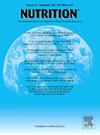Association between plant-based diets and risk of metabolic dysfunction–associated steatotic liver disease in Korean adults: A prospective cohort study
IF 3.2
3区 医学
Q2 NUTRITION & DIETETICS
引用次数: 0
Abstract
Objectives
Few studies have investigated the correlation between plant-based diet indices (PDIs) and the risk of metabolic dysfunction-associated steatotic liver disease (MASLD) in the Korean population. Therefore, this study aimed to investigate the association between PDIs and the risk of MASLD in Korean adults.
Methods
This cohort study utilized data from the Health Examinees Study conducted in the South Korean population. Dietary and nutrient intake were assessed at baseline and follow-up using a food frequency questionnaire and the Korean Food Consumption Table. Food items were categorized into overall PDI, healthy PDI (hPDI), and unhealthy PDI (uPDI), with MASLD defined using the fatty liver index. Baseline characteristics and food intake groups were evaluated based on PDI quintiles and stratified by sex. Further analyses involved stratification by age, body mass index, alcohol intake, and physical activity in men and women.
Results
Over a median follow-up period of 4.2 y, MASLD occurred in 1532 participants. Both men and women in the highest hPDI quintile had a reduced risk of MASLD (men: HR: 0.71, 95% CI: 0.55–0.91, p = 0.0031; women: HR: 0.61, 95% CI: 0.48–0.78, p < 0.0001). Conversely, the highest uPDI quintile was associated with a higher risk of MASLD.
Conclusions
This cohort study revealed an association of the overall PDI and hPDI with a lower risk of MASLD, highlighting the importance of adhering to these types of plant-based diets to prevent MASLD among Korean adults.
韩国成年人的植物性饮食与代谢功能障碍相关性脂肪肝风险之间的关系:一项前瞻性队列研究。
研究目的在韩国人群中,很少有研究调查植物性饮食指数(PDI)与代谢功能障碍相关性脂肪性肝病(MASLD)风险之间的相关性。因此,本研究旨在调查韩国成年人的植物性饮食指数与 MASLD 风险之间的关联:这项队列研究利用了在韩国人口中开展的健康体检者研究的数据。在基线和随访期间,使用食物频率问卷和韩国食物消费表对膳食和营养素摄入量进行了评估。食物项目被分为总PDI、健康PDI(hPDI)和不健康PDI(uPDI),MASLD用脂肪肝指数来定义。根据 PDI 五分位数评估基线特征和食物摄入量组别,并按性别进行分层。进一步的分析包括按男性和女性的年龄、体重指数、酒精摄入量和体力活动进行分层:在中位 4.2 年的随访期间,1532 名参与者发生了 MASLD。hPDI最高的五分之一男性和女性发生MASLD的风险都有所降低(男性:HR:0.71,95% CI:0.55-0.91,p = 0.0031;女性:HR:0.61,95% CI:0.48-0.78,p < 0.0001)。相反,uPDI最高的五分位数与较高的MASLD风险相关:这项队列研究揭示了整体 PDI 和 hPDI 与较低的 MASLD 风险之间的关系,强调了在韩国成年人中坚持这些类型的植物性饮食对预防 MASLD 的重要性。
本文章由计算机程序翻译,如有差异,请以英文原文为准。
求助全文
约1分钟内获得全文
求助全文
来源期刊

Nutrition
医学-营养学
CiteScore
7.80
自引率
2.30%
发文量
300
审稿时长
60 days
期刊介绍:
Nutrition has an open access mirror journal Nutrition: X, sharing the same aims and scope, editorial team, submission system and rigorous peer review.
Founded by Michael M. Meguid in the early 1980''s, Nutrition presents advances in nutrition research and science, informs its readers on new and advancing technologies and data in clinical nutrition practice, encourages the application of outcomes research and meta-analyses to problems in patient-related nutrition; and seeks to help clarify and set the research, policy and practice agenda for nutrition science to enhance human well-being in the years ahead.
 求助内容:
求助内容: 应助结果提醒方式:
应助结果提醒方式:


